

February 2005 Edition Vol. 5 Issue 1
An Internet Newsletter publication for all CIM Alumni and friends.
 |
 | |
February 2005 Edition Vol. 5 Issue 1 |
An Internet Newsletter publication for all CIM Alumni and friends. | |
Clem S. Estrera, Jr., M.D. | Ma. Belen Rosales, M.D. | Ray Castillejo, M.D. |
 | Valentine's Edition“If you can just observe what you are and move with it, then you will find that it is possible to go infinitely far.” ---J. Krishnamurti Planning a Charted Course - Part 2Cle S. Estrera, Jr.Fun in games |
I once used to play tennis with an older man in the public tennis court near our house. I did not know he was a professional tennis player because he played with me like he was a beginner until I saw him playing in the country club against a good tennis player who was also a tennis instructor of the club when I went there for my co-worker’s retirement celebration. He did not see me and I did not approach him. I also did not tell him about it. He continued to play with me and other beginners like me in the public park, others looking or waiting for someone to play with.
We became good friends and when I finally told him that I saw him playing like a pro in the country club, he smiled and told me that he used to be a good tennis player and a tennis instructor in two country clubs, but he retired after he had a knee surgery. He stated that he missed doing something when he was teaching tennis. He was troubled by the thought that he did not really make an impact on his students because he was always busy making his schedules, and his attention was mainly consumed thinking of the number of hours and the number of students, rather than of the better ways of teaching his students. He regretted that he did not develop good or friendly relationship with his students that would have made them more relax and enthusiastic, making the game more fun. He confessed that he is trying to make it up like make a difference. He was eager to say that he never had so much fun playing tennis with beginners or amateurs without the thought of being paid for it, and that even his game, he said, had improved a lot. I joked that perhaps it was the anesthesia that caused his change of heart.
There are extraordinary friends or individuals we meet and make friends with that come and go in our life. We don’t exactly lose them; they move on and move away from us to continue their own life’s wonderful journey. You learn whatever you can from the relationship and make the most of it, and just feel lucky and grateful to have crossed paths with these incredible individuals. We all have so much to give others and so much more to learn from them. I myself have never walked away from a meeting with someone extraordinary I make friend with, without getting more than I gave. Thus every time I have the opportunity, I try to give more than I get.
The motivation
Because our lives are a series of selections, a series of vast choices – activities to participate in, projects to do, places to go, friendships to cultivate, etc. - it’s extremely difficult to commit ourselves to a certain activity especially something voluntary we share with others, and go all the way without being squashed by defeat, for in times of difficulty and discouragement, it’s all too easy to succumb to the thought that we should have chosen another activity. Thus we need to have some kind of motivation that could strengthen our resolve and determination, something that keeps ourselves open to possibility, that reminds us to rule out nothing so that when we fall short of our goals, we don’t end up feeling all is lost, but rather something is gained. For it is much easier to switch projects or activities than to see them to their end, but it is in their doing that we develop our talents to the fullest. Each time we back off, letting our commitment die, we are opting for less than a full life.
So when you embark on an activity especially if it’s voluntary, besides having fun, seriously consider that you’re going to do it because you also want to make a difference. Believe me. To make a difference has been the driving force that helps me overcome and rise above doubts, fears and difficulties; that keeps my temporary discouragement from mushrooming into stronger feelings of defeat and failure; that moves me from isolation to interaction to become part of something worthwhile. It drove me to learn at least the basic web design in order to build our own CIM 1972 web site that soon led to the birth and growth of Brain Waves. It reminds me that difficulties are there just to shake my resolve, challenge my determination, keep me humble, and make me keep in mind that nothing worth doing in life is easy. It has made me realized the many things I never thought I had, and made me understand that to truly appreciate God’s blessings is to share them with others.
Thus immediately think of making “to make a difference” your motive, and develop the attitude as such toward the activity you plan to undertake. For once that attitude is firmly established in your mind, whatever things you do, you not just try to do them; you do them the best you can. And whatever tasks you accept to perform, you perform them like your integrity depends on them. Soon you’d learn to believe in your abilities and develop faith in yourself. Your life becomes filled with potentials rather than possibilities, intentions rather than insecurities, actions rather than anxieties, and results rather than repeated attempts. The work you do becomes an expression of your energy and creativity – an experience that gives you satisfaction, challenge, and fulfillment.
The obstacle
If there is an obstacle that would stand in your way and make it extremely difficult for you to go on when things get rough and the going gets tough, it is your own childish behavior of self-centeredness. You have to outgrow the need to be the center of attention, or the need for personal recognition, because it would make you view every negative comment or criticism a discouragement that would easily weaken your resolve and wobble your determination. Self-centeredness would make you think of your task in terms of your gain – what you get from it, what’s in it for you, or how much recognition others can give you rather than how much you can learn from it, grow from it, or what it can help you give others - making you see your task as draining, unrewarding and unfulfilling; in other words - a thankless job.
Unless you outgrow the childish behavior of self-centeredness, you’d be buffeted by every wind of difficulty and sunk by just a little wave of disappointment. A minor discouragement can readily mushroom into defeat and failure that would make you think in terms of limitations rather than potentials, thorns instead of roses that would only dash your hopes and desires, preventing you from developing your talents and achieving your goals. You’d find it easy to blame, whine and complain and to justify quitting by utilizing the conventional and convenient argument that what you’re doing is not worth it. You’d grow old wondering about the so many things that could have been. Now you can’t say that I didn’t tell you.
A golden opportunity
Until now, I don’t know how my wife found out that I took piano lesson and quit even before I've learned anything, because I had never said a word about it to her, the same way as Mr. Clark (Richard Gere) in the movie Shall We Dance did not tell anyone, not even his daughter and wife that he was taking lessons in Ballroom Dancing. There are skills that you want to develop by yourself and don’t want anyone to know about it until you are more confident with it, because others, even your own family, sometimes become an obstacle to achieving your goal. Also, I just didn’t want to talk about something that might only make me wonder again and again what might have been especially an irresistible challenge. To me, it was one of those golden opportunities to keep my mouth shut. After all, there was really nothing penetrating happened.
Perhaps my childhood and youthful exposures and experiences have made me more cautious on certain things that I sometimes prefer to keep anyone from knowing them especially my own family, with no other intention than to avoid conflict, confrontation, or trouble. There are things that are better left alone to fade, and then forgotten, for talking about them could become like opening a can of worms. All too often husbands and wives have the tendency to recall over and over past problems to justify their present disagreement and to support their accusation against each other as if each other’s history is as essential in their arguments and accusations as diagnosing a medical illness. When problems had already been resolved, they should be forgotten and not brought up again. Otherwise problems would continue accumulating on top of each other. If problems are being brought up again, then you haven’t really resolved them. They have become like wounds that open up because you keep scratching them again and again.
An observation
Having lived with different married couples and families in the past as I was growing up, it has been my personal observation that there are women who, (no offense or sarcasm to women intended) even only on gossip, suspicion or circumstantial evidence that their husbands maybe cheating on them, would react with anger, hatred and disbelief, and become hysterical and threatening, so that no matter how honest a husband you could be, they would never be satisfied with your answers or explanations. They would subject you to an emotional excision as though you stuck out like bunion. They would nag and emotionally neuter you with practically the same ridiculous questions and accusations that they would ask over and over and yell at you until they are soaked with perspiration, their face turns red, their pupils are dilated and their voice turns into a moan and groan like they are having an orgasm.
They won’t let you sleep, and they make you lose your libido. Thus for all practical intentions and purposes, you are neutered. It is because their main concerns are to accuse and blame you so that no matter how flimsy the evidence of their suspicion is, they would scream and yell at you to castigate and emotionally castrate you, make you feel guilty and dirty, small and useless, instead of to stop, think and then to look within themselves, to search out the character flaws that maybe contributing to their distress. Their behavior would only prolong the disagreement and deepen the crisis. It would rock, roil and rattle everything, and resolve nothing. A minor conflict would easily turn into a major crisis. The emotional toll could be devastating. Yet no matter what their spouse, partner or lover has done or said, these women would always be better off focusing on how they might have contributed to the problem through action, word, or attitude.
The song Crazy by Patsy Cline gives us an insight on the importance and advantage of setting our focus within ourselves when a relationship that we are a part of sours in order to be able to realize and accept our part of the responsibility instead of blaming everything on the person at the other end of the relationship. If you just think about it, as far as your relationship with anyone is concerned, it began and has developed because you choose to be a part of it. It was your choice that has made the existence of such relationship possible, and it is also your choice to end it anytime or continue with it negatively or positively. But whether you understand it or not, you are responsible for every choice you’ve made and every choice you are going to make, unless you are a mental case. Imagine the chaos created if people don’t take responsibilities of their choices. And your responsibility doesn’t just stop with your choices per se, for choices have consequences that can occur way into the future. As someone said, “When you pick up one end of the stick, you pick up the other.”
So, aren’t you also part of the blame then? Granted that it’s not your fault, but does it make you happy to put all the blames on your partner? Does it give you peace of mind? Does it remove the bitterness in you to make you a better person? Patsy Cline realized the mistake of her choice, and so she accepted her responsibility and sang: “Crazy… for thinking that my love could hold you…. I’m crazy for trying, I’m crazy for crying, and I’m crazy for loving you…” Now it’s easy to imagine Patsy Cline leaving the pain of the past behind, and move on.
Nonetheless I think it’s these women’s insecurity that makes it difficult for them to stop struggling and think rationally. Thus what they really need is reassurance. The trouble is, they make it impossible for you to reassure them because they don’t listen to you, let alone believe you. They are too emotional to have a rational conversation. Trying to reassure a person who doesn’t even listen to you, let alone believe you would be like trying to make the Sphinx smile. You might as well not even try to talk about it and just let them sweat it out if they want to. It’s like getting the flu; nothing much you can do about it but wait for the headache, fever and congestion to go away. Talking about anything to a person who is in distress and not ready to listen is like peeing into a hurricane. You’ll only get wet with your own urine. (To be continued)
"The three hardest tasks in the world are neither physical feats nor intellectual achievements, but moral acts: to return love for hate, to include the excluded, and to say, I was wrong."-- -- Sydney J. Harris, British-born American journalist (1917-1986)
This interesting history is taken from an e-mail message of my good American friend.
The next time you are washing your hands and complain because the water temperature isn't just how you like it, think about how things used to be.
Most people got married in June because they took their yearly bath in May and still smelled pretty good by June. However, they were starting to smell, so brides carried a bouquet of flowers to hide the body odor.
Hence the custom today of carrying a bouquet of flowers when getting married.
Baths consisted of a big tub filled with hot water. The man of the house had the privilege of the nice clean water, then all the other sons and men, then the women and finally the children. Last of all, the babies. By then the water was so dirty you could actually lose someone in it.
Hence the saying, "Don't throw the baby out with the bath water."
Houses had thatched roofs-thick straw-piled high, with no wood underneath. It was the only place for animals to get warm, so all the cats and other small animals (mice, bugs) lived in the roof. When it rained it became slippery and sometimes the animals would slip and off the roof.
Hence the saying: "It's raining cats and dogs."
There was nothing to stop things from falling into the house. This posed a real problem in the bedroom where bugs and other droppings could mess up your nice clean bed. Hence, a bed with big posts and a sheet hung over the top afforded some protection. That's how canopy beds came into existence.
The floor was dirt. Only the wealthy had something other than dirt.
Hence the saying "dirt poor."
The wealthy had slate floors that would get slippery in the winter when wet, so they spread thresh (straw) on floor to help keep their footing. As the winter wore on they added more thresh until when you opened the door it would all start slipping outside. A piece of wood was placed in the entranceway.
Hence the saying a "thresh hold."
In those old days, they cooked in the kitchen with a big kettle that always hung over the fire. Every day they lit the fire and added things to the pot. They ate mostly vegetables and did not get much meat. They would eat the stew for dinner, leaving leftovers in the pot to get cold overnight and then start over the next day. Sometimes stew had food in it that had been there for quite a while.
Hence the rhyme, "Peas porridge hot, peas porridge cold, peas porridge in the pot nine days old."
Sometimes they could obtain pork, which made them feel quite special. When visitors came over, they would hang up their bacon to show off. It was a sign of wealth that a man could "bring home the bacon." They would cut off a little to share with guests and would all sit around and "chew the fat."
Those with money had plates made of pewter. Food with high acid content caused some of the lead to leach onto the food, causing lead poisoning death. This happened most often with tomatoes, so for the next 400 years or so, tomatoes were considered poisonous.
Bread was divided according to status. Workers got the burnt bottom of the loaf, the family got the middle, and guests got the top, or "upper crust."
Lead cups were used to drink ale or whisky. The combination would sometimes knock the imbibers out for a couple of days. Someone walking along the road would take them for dead and prepare them for burial. They were laid out on the kitchen table for a couple of days and the family would gather around and eat and drink and wait and see if they would wake up. Hence the custom of holding a "wake."
England was old and small and the local folks started running out of places to bury people. So they would dig up coffins and would take the bones to a "bone-house" and reuse the grave. When reopening these coffins, 1 out of 25 coffins were found to have scratch marks on the inside and they realized they had been burying people alive. So they would tie a string on the wrist of the corpse, lead it through the coffin and up through the ground and tie it to a bell. Someone would have to sit out in the graveyard all night (the "graveyard shift") to listen for the bell; thus, someone could be "saved by the bell or was considered a "dead ringer."
And that's the truth... Now, whoever said that History is boring!
"Good humor is a tonic for mind and body. It is the best antidote for anxiety and depression. It is a business asset. It attracts and keeps friends. It lightens human burdens. It is the direct route to serenity and contentment."-- Grenville Kleiser, American author (1868-1953)
A teacher, a garbage collector and a lawyer all died and went to heaven on the same day. St. Peter was in a bad mood because so many people had been dying recently that heaven was getting overcrowded. So he told the three that they would each have to pass an entrance examination in the form of a single question. If they got it right, they would be allowed in; if not, hard luck.
St. Peter addressed the teacher first: “Here is your question. What was the name of the ship which crashed into an iceberg in the Atlantic in 1912, resulting in a huge loss of life?”
“Was it the Titanic?” asked the teacher.
“Yes,” said St. Peter and allowed the teacher through the heavenly gates.
St. Peter didn’t really want a garbage collector stinking out heaven so he decided to make his question a little more difficult. “How many people died on the Titanic?”
“Fifteen hundred and twenty-three,” said the garbage man.
“That’s right,” said St. Peter.
Then St. Peter turned to the lawyer. “What were their names?”
Mrs. Rosenberg was so proud. “Did you hear about my son Isaac?” she asked Mrs. Bernstein. “He’s going to a psychiatrist, twice a week.”
“Is that good?” queried Mrs. Bernstein.
“Good?” exclaimed Mrs. Rosenberg. “Of course it’s good. Not only does he pay 90 dollars an hour but all he talks about is me!”
A city dweller bought a farm and decided to purchase his stock from an old farmer.
“I’d like to buy a rooster,” he told the farmer.
“Sure,” said the farmer, “but in these parts we call ‘em cocks.”
“Right, and I also want to buy a chicken.”
“No problem,” said the farmer, “but in these parts we call ‘em pullets.”
The city guy paid for the two birds and put each one in a cage. Worried about transportation, he said, “Maybe I ought to buy a donkey too.”
“Good idea,” said the farmer, “but in these parts we call ‘em asses. I tell you what. I’ll let you have old Jake. He is a good animal, but a bit stubborn. Sometimes you have to scratch him between the ears to get him to move.”
“Right, I’ll remember that,” said the city guy.
So he set off with the donkey and the cages, but half a mile down the road, the donkey stopped and refused to move. Just then a lady passed by on her way back from church.
“Excuse me, ma’am,” said the city guy, “would you please hold my cock and pullet while I scratch my ass?”
“Never refuse any advance of friendship, for if nine out of ten bring you nothing, one alone may repay you.” – Madame de Tencin
What are dreams for?
Langston Hughes said: “Hold fast to dreams for if dreams die, life is a broken-winged bird that cannot fly.”
When we were little kids, we believe in dreams and there was no reason for us to believe our dreams couldn’t come true, for we hadn’t yet developed fear, doubt and insecurity. But as we grew older, we began to lose our dreams. Fantasies no longer fly because they are weighted down by doubts, fear and paranoia. We no longer believe in dreams because we either became overly practical or highly irresponsible. Our practical side would say - “That’s impossible to do,” while our irresponsible nature would say – “Someone else would have to do it.”
So how many dreams have we let die? How many projects did we start only to leave them unfinished? How many times did we say to ourselves, “I’m gonna do this,” but then didn’t work to make it so? How many times have we promised ourselves, “This time it’s going to be different,” and then went on to forget about it?
Dreams help us put into an image that which our souls desire to do, that which we want to achieve. Dreams are hopes and wishes and they are full of purpose. They are there to inspire us, to broaden our horizon, to encourage us to strive and reach beyond our present goal. They give our forward movement a structure and focus. They are like invitations from God to spread our wings and fly to new heights. They act as signs and signals or guideposts along the paths to our destination. Had we no dreams, we’d quickly lose our desire to live. Pamela Vaull Starr advised: “Reach high, for stars lie hidden in your soul. Dream deep, for every dream precedes the goal.”
The CIM Class 1972 had a dream
It started as a dream of the few of us of the CIM Class 1972, a dream of getting our classmates together to try to reach back more than thirty years by re-connecting with each other to make us closer together the way we once used to be in order to recapture the youthful enthusiasm and exuberance we once used to have, and to rekindle the belief that having the feeling of connectedness to each other, we’d no longer have to fumble and falter our way through our different tolerance and sensitivity, uncertain and hesitant of what to say, what jokes and stories to tell.
So we pursued the dream and like a wild idea, it caught the excitement of the many, who soon realized that acceptance by each other is our want. Unconditional love is our due. We cherished our moments together and started to miss each other the moment we were to part. We felt loved because we gave love to each other freely. In some measure, at some time, we do reap what we sow.
Love is not just a feeling or a word we say or write. Love is a truth filled with tolerance, respect, kindness, compassion and forgiveness. It is the sum total of the good human qualities that make us a person of character. It is the way we present ourselves to others or to the world – the face we put on, the behavior we show, the feelings we express – our very heart and soul. It's the vital part of our being. If we’re not made up of love, we’ll reflect this feeling to others and experience it within ourselves. Inside our chest will be a heart, but a heart that is heavy and cold and made of stone.
After we had our first Class 1972 get-together, we soon knew deep within each of us that the gentle nature of love softens our calloused souls, opens a channel between us, and invites pleasant response that closes the distance. We also noticed that friendship that helps us develop mentally and emotionally to our full stature cannot grow, let alone bloom if we maintain distance instead of closeness, if we cultivate alienation rather than participation, and if we seek isolation and shy away from friendly contact rather than taking advantage of the opportunity of celebrating life and chatting together.
It's with the involvement especially with our friends that we learn who we are. We are changed by our experiences. Every situation, every person, every feeling, every idea, every joke, has at least slightly different flavor each time we encounter it. Our awareness gives way to new understanding. It's an invitation to come alive.
The name is bond – friendship bond
Having the bond of friendship established, many of us of the Class 1972 had another dream and we all decided to pursue it not because we are after of some glory, but because doing it is not just a good thing to do, it’s also a way of expressing love and sharing God's blessings. So together we contributed in establishing funds to make that dream come true – to let our colleagues and future colleagues in CIM know that we are aware of their struggles and that we’d do the best we can to help them.
The CIM Class 1972 is proud to announce that it has recently donated five fast computers and two fast laser printers to CIM through Dr. Virginia Mesola, and extra funds for miscellaneous things that go along with them. Most if not all of us of the Class 1972 have been aware that in these day and age, technology is essential in learning that pretty soon into the future, students will have hard time learning without it, if they are not having a hard time yet. Because computers are as good only as the programs installed in them, our Class 1972 is also establishing online subscriptions for different medical journals for CIM, and will maintain these subscriptions indefinitely.
Our Class 1972 organization is established mainly as an organization of friendship. It is not designed, let alone intended as a way of separating ourselves from the whole CIM alumni association. It is intended solely for all of us in the Class 1972 to have all the time together for a certain number of days or a long weekend, simply to have fun, to share jokes and personal stories and to solidify the bond between us. Thus we have our get-together only every other year, because we don't want to be misconstrued that we are separating from ASOCIMAI.
“It’s only love … and that is all”
Since we of the CIM Class 1972 choose love as our means of relating to others, we decided to have the CIM project as our expression of love and gratitude to life. Although the past is past and it's useless to dwell on it, it is sometimes helpful to cast a backward glance; it has a way of sharpening our gratitude. We can look back on our old life and be thankful for what we are now. If we live this long relatively healthy with a good job, then life has been good to us. J. Robert Maskin said: "One of life's gifts is that each of us, no matter how tired and downtrodden, finds reasons for thankfulness."
Furthermore, this CIM project would give meaning to our Class 1972 organization; it would give it a sense of purpose. And it would give us members a sense of pride, of usefulness and of doing something of value, like a pulse of life that beats through everyone and everything, making us parts of the universe. Because it's human nature and desire to be counted, to be useful, or to be a part of something worthwhile, it is the feeling of at least some of us that this project would also solidify and strengthen the bond of friendship between us to hopefully last a lifetime.
Suffice it to say, there are projects that a small class organization is able to accomplish simply, swiftly and finally that a bigger alumni association is not able to, not because the bigger organization doesn’t have the funds or the will to proceed, but because when a decision is made if it ever is on a certain idea or project, there is doubt, reluctance, or hesitation to carry it out, not to mention procrastination, because all too often there is a lack of trust and accountability that gives way to the lack of enthusiasm and cooperation, creating a vicious cycle.
There is also an almost absolute total lack of support when something goes wrong, or even if it’s only someone’s perception and accusation that something is wrong. You are left alone to tackle the accusation on your own. There are even those who would rather admonish you than support you. It is as if all the good things you have done have all of a sudden become bad. It leaves you with an awful feeling of abandonment and helplessness. You wonder where the love is. It makes you think that perhaps it's what Jesus Christ felt when he was accused, about to be put on trial and sentenced to be crucified. He was abandoned like He was the devil.
Indeed this is my personal experience and observation of ASOCIMAI. I believe that it's the almost complete lack of the essential human qualities and its inability to carry out a decision and keep its promises that have made our alumni association lose its significance. It has failed to maintain a sense of purpose and thus it is unable to provide the members with a sense of pride that is very important in maintaining enthusiasm. When enthusiasm fades, cooperation would diminish. Further, where love is not given nor received, there is a barrier that would only become a source of tension and conflict. Inside me I have always asked this question: Why a barrier when it only complicates things and drains our energy when love is so much easier and simpler and it fills us with energy?
But in our Class 1972 organization, there is always more than enough support, encouragement and reassurance no matter what happens, because that’s what friends are for. There are always those who are aware that in friendship, solutions to problems are seldom found in the head, for all too often they are found in the heart. Thus they don’t have to think; they give their support and love freely to a friend who is hurting or in distress by offering kind words.
Friends understand that love gives a friend the courage to tackle one's trouble. When you know that friends are there to love and support you in times of setback and disappointment, just the knowledge itself gives you the courage and confidence to scale mountains, or to confront what's lying ahead. Is it not that the most important thing that Jesus Christ asked of every one of us is – to love one another? It's obvious that Jesus doesn't want us to base our actions on logic alone. He wants us to be carried away with love. Karl A. Menninger said: "Love cures people, the ones who receive love and the ones that give it, too." The love we feel toward others and the love we receive readily change our perceptions so that the same pictures that looked so dismal in past years can look full of promise, possibilities and even rich in the present. It's almost like magic.
Well, Class 1972, we’ve done what we’ve decided to do. We’ve talked the walk and we’ve walked the talk. We’ve made our dreams come true. Our project accomplishment may not be much, but it’s significant because we did it and will continue to do it out of love. Now let’s sit back, relax and listen to Carol King’s song:
You’ve got to get up every morning with a smile on your face, |
"If you make it plain you like people, it's hard for them to resist liking you back." ---Lois McMaster Bujold
From the designer genes of Primo and Chi-Chi Maestrado of the CIM Class 1996, a baby is created. By the looks of her, she doesn't want to become an Obstetrician. I don't blame you Ashley. Ashley was born a month ago and looking at her picture when she was born, she's going to be a pretty girl when she grows up to be a teenager. And so, watch out, Primo! Make sure the shotgun is loaded.
 | 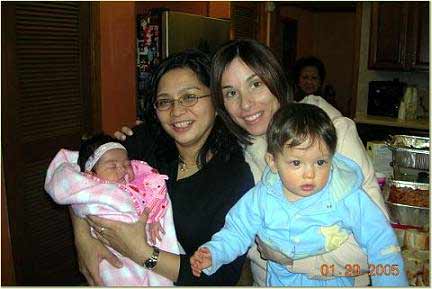 |
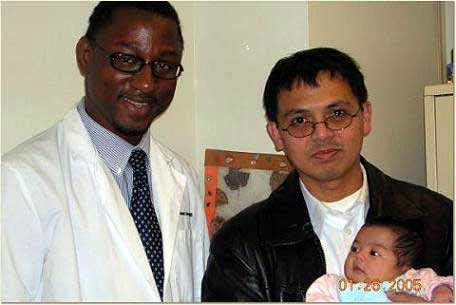 |  |
 |  |
Gaming Erum of the CIM Class 1972 is proud and happy to announce the upcoming wedding of her daughter, Karina, to Alistair Agujar on February 8, 2005 in San Francisco, California where the bride and the groom, both occupational therapists, are working. Below are their pictures. They are a handsome couple. They make you want to give anything just to be young again.
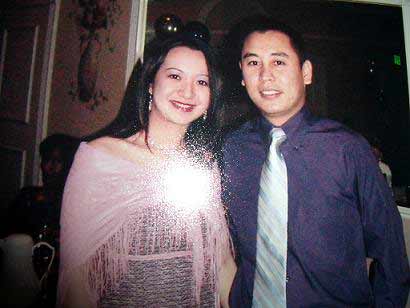 | 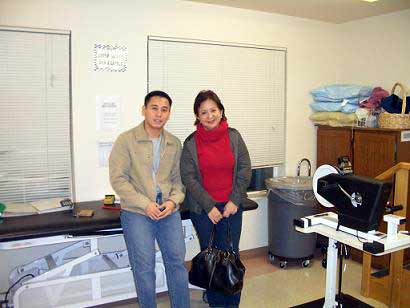 |
 | 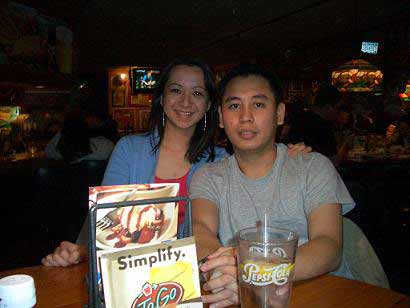 |
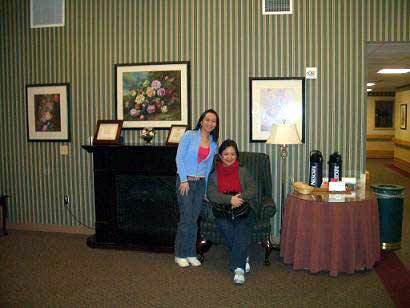 |
   |

|